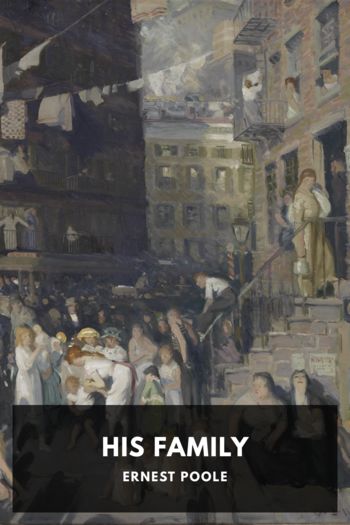His Family - Ernest Poole (ereader for comics .txt) 📗

- Author: Ernest Poole
Book online «His Family - Ernest Poole (ereader for comics .txt) 📗». Author Ernest Poole
“What is this going to mean to me?”
Millions of people were asking that. And so did Roger and Deborah. The same night they left for New York, while Edith with a sigh of relief settled back into her family.
The next morning at his office Roger found John waiting with misery stamped on his face. John had paid small heed to war. Barely stopping for sleep in the last two days he had gone through scores and hundreds of papers, angrily skipping all those names of kings and emperors and czars, and searching instead for American names, names of patrons—business! Gone! Each hour he had been opening mail and piling up letters cancelling contracts, ordering service discontinued.
Roger sat down at his desk. As he worked and figured and dictated letters, glancing into the outer rooms he saw the long rows of girls at tables obviously trying to pretend that there was work for them to do. He felt them anxiously watching him—as in other offices everywhere millions of other employees kept furtively glancing at their chiefs.
“War,” he thought. “Shall I close down?” He shrank from what it would mean to those girls. “Business will pick up again soon. A few days—weeks—that’s all I need.”
And he went to his bank. No credit there. He tried other sources, all he could think of, racking his brains as he went about town, but still he could not raise a loan. Finally he went to the firm which had once held a mortgage on his house. The chief partner had been close to Bruce, an old college friend. And when even this friend refused him aid, “It’s a question of Bruce’s children,” Roger muttered, reddening. He felt like a beggar, but he was getting desperate. The younger man had looked away and was nervously tapping his desk with his pen.
“Bad as that, eh,” he answered. “Then I guess it’s got to be done.” He looked anxiously up at Roger, who just at that moment appeared very old. “Don’t worry, Mr. Gale,” he said. “Somehow or other we’ll carry you through.”
“Thank you, sir.” Roger rose heavily, feeling weak, and took his departure. “This is war,” he told himself, “and I’ve got to look after my own.”
But he had a sensation almost of guilt, as upon his return to his office he saw those suddenly watchful faces. He walked past them and went into his room, and again he searched for ways and means. He tried to see his business as it would be that autumn, to see the city, the nation, the world as it would be in the months ahead. Repeatedly he fought off his fears. But slowly and inexorably the sense of his helplessness grew clear.
“No, I must shut down,” he thought.
On his way home that evening, in a crush at a turbulent corner he saw a big truck jam into a taxi, and with a throb of rebellion he thought of his son-in-law who was dead. Just the turn of a hair and Bruce might have lived and been here to look after the children! At the prospect of the crisis, the strain he saw before him, Roger again felt weak and old. He shook off his dread and strode angrily on.
In his house, the rooms downstairs were still dismantled for the summer. There was emptiness and silence but no serenity in them now, only the quiet before the storm which he could feel from far and near was gathering about his home. He heard Deborah on the floor above, and went up and found her making his bed, for the chambermaid had not yet come. Her voice was a little unnatural.
“It has been a hard day, hasn’t it. I’ve got your bathroom ready,” she said. “Don’t you want a nice cool bath? Supper will be ready soon.”
When, a half hour later, somewhat refreshed, Roger came down to the table, he noticed it was set for two.
“Isn’t Allan coming?” he asked. Her mobile features tightened.
“Not till later,” she replied.
They talked little and the meal was short. But afterwards, on the wooden porch, Deborah turned to her father,
“Now tell me about your office,” she said.
“There’s not enough business to pay the rent.”
“That won’t last—”
“I’m not so sure.”
“I am,” she said determinedly. Her father slowly turned his head.
“Are you, with this war?” he asked. Her eyes met his and moved away in a baffled, searching manner. “She has troubles of her own,” he thought.
“How much can we run the house on, Deborah?” he asked her. At first she did not answer. “What was it—about six thousand last year?”
“I think so,” she said restlessly. “We can cut down on that, of course—”
“With Edith and the children here?”
“Edith will have to manage it! There are others to be thought of!”
“The children in your schools, you mean.”
“Yes,” she answered with a frown. “It will be a bad year for the tenements. But please go on and tell me. What have you thought of doing?”
“Mortgage the house again,” he replied. “It hasn’t been easy, for money is tight, but I think I’ll be able to get enough to just about carry us through the year. At home, I mean,” he added.
“And the office?”
“Shut down,” he said. She turned on him fiercely.
“You won’t do that!”
“What else can I do?”
“Turn all those girls away?” she cried. At her tone his look grew troubled.
“How can I help myself, Deborah?





Comments (0)